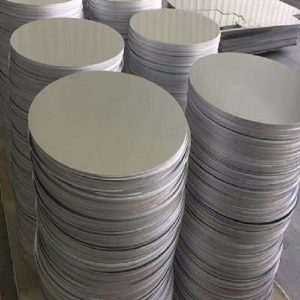INTRODUCTION TO ALUMINUM DISC:
Aluminum discs are widely used in various industries due to their unique properties, such as low density, high strength, excellent corrosion resistance, and high thermal conductivity. In this article, we will explore the various applications and benefits of aluminum discs.
Aluminum discs are circular flat sheets made of aluminum, also known as aluminum circles. They are often cut from larger aluminum sheets or coils using specialized equipment. Aluminum discs can be produced in a variety of sizes and thicknesses to meet the specific requirements of different industries.
APPLICATIONS OF ALUMINUM DISC IN DIFFERENT INDUSTRIES:
One of the primary applications of aluminum discs is in the manufacturing of cookware. Due to their excellent thermal conductivity, aluminum discs can efficiently transfer heat, making them ideal for use in pans, pots, and other cooking utensils. Aluminum cookware is also lightweight, which makes it easy to handle and maneuver.
Another common application of aluminum discs is in the production of road signs. Aluminum is a durable material that can withstand harsh weather conditions, making it an ideal choice for road signs that need to be durable and long-lasting.
Aluminum discs are also used in the automotive industry, where they are used to produce wheels, engine parts, and other components. Aluminum is lightweight, which makes it an excellent choice for automotive parts, as it can help improve fuel efficiency and reduce emissions.
Aluminum discs are also widely used in the construction industry, where they are used to produce roofing sheets, siding, and other building materials. Aluminum is lightweight and easy to work with, which makes it an ideal choice for construction projects that require materials that are both durable and easy to handle.
ADVANTAGES OF USING ALUMINUM DISCS:
Aluminum discs offer several benefits. First, they are lightweight, which makes them easy to handle and transport. Second, aluminum is corrosion-resistant, which means it can withstand exposure to moisture and other harsh environmental conditions. Third, aluminum is recyclable, which makes it an environmentally friendly choice for many industries.
ALUMINUM DISCS IN THE ELECTRONICS INDUSTRY:
Aluminum discs can also be used in the electronics industry, where they are used to manufacture electronic components such as capacitors, heat sinks, and printed circuit boards (PCBs). Aluminum has excellent electrical conductivity, which makes it an ideal material for manufacturing these types of components.

China aluminum disc supplier
ALUMINUM DISCS IN THE AEROSPACE INDUSTRY:
Aluminum discs are also used in the aerospace industry, where they are used to produce aircraft parts such as wings, fuselage, and landing gear. Aluminum’s high strength-to-weight ratio makes it an ideal material for aerospace applications, where weight is a critical factor in determining fuel efficiency and performance.
ALUMINUM DISCS IN THE MEDICAL INDUSTRY:
Aluminum discs can also be used in the medical industry, where they are used to manufacture various medical devices such as prosthetic limbs, orthopedic implants, and medical instruments. Aluminum is a biocompatible material that is safe for use in the human body, making it an ideal choice for medical applications.
FUTURE INNOVATIONS AND USES FOR ALUMINUM DISCS:
Aluminum discs can be produced using various methods such as hot rolling, cold rolling, and extrusion. The method used will depend on the specific requirements of the application and the properties needed for the final product.
In terms of surface finish, aluminum discs can be produced with various finishes, including mill finish, anodized finish, and brushed finish. Each finish offers its unique properties, and the choice of finish will depend on the specific requirements of the application.
CONCLUSION:
Aluminum discs are versatile materials that offer a wide range of applications and benefits. From cookware to construction materials, aluminum discs are used in various industries due to their excellent properties, including low density, high strength, corrosion resistance, and thermal conductivity. As technology continues to advance, it is likely that we will see even more innovative uses for aluminum discs in the future.

